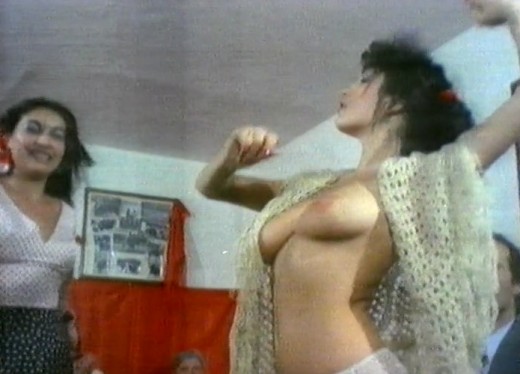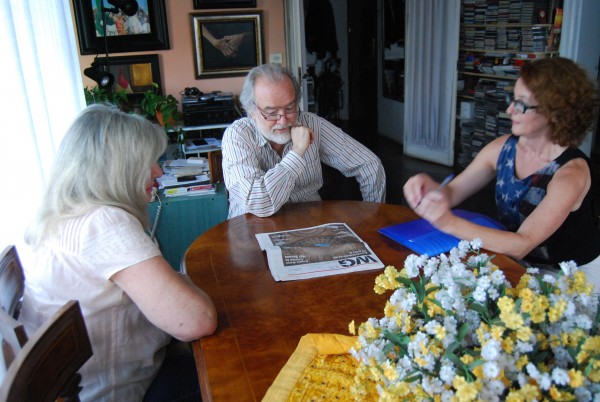By Mariola Rey, in collaboration with Elena Piñango.

Still from “Corridas de Alegría” (1982)
There are some artists who never bridge the Atlantic divide, or do so later in their careers, if not posthumously. Friend, and former Williamsburg dancer, Mariola Rey, introduces a Spaniard who may be on his way to doing so in the twilight of his career. Meet Gonzalo García-Pelayo, a music producer, a movie producer, a man who has been both celebrated and reviled in his own country for his irreverence and dark themes. —Editor
Gonzalo Garcia-Pelayo, now in his late sixties, is especially recognized in Europe for penning and directing Alegrías de Cádiz (2013), Vivir en Sevilla (1978), and Manuela (1976). Among the hundreds of records he produced, he is widely known for producing a flamenco-blues band called Triana in 1970s Spain.
But, talk about a left turn, in the late 80s and early 90s he gained notoriety for…. of all things, creating a legal way to “break the bank” in gambling casinos. He and his family made more than a million dollars by inventing a “system” using a theory of probability, which took advantage of individual quirks in roulette tables, including imperfections in their manufacturing, and the uneven leveling of the floor. He would eventually be banned from the biggest casino of Madrid, and many casinos in other parts of Europe, as well as casinos in Las Vegas. There’s a movie made about his and his family’s experience, called Winning Streak.
Garcia-Pelayo hasn’t produced a movie in 30 years (too busy breaking casinos, I guess, or living off the earnings), but now he’s certainly back, and in the process of making a film that seems to be signaling a major comeback for the artist.
Garcia-Pelayo’s career started in the mid 70’s, when Franco’s death ended the dictator’s 40-year reign in Spain. Manuela portrays the real, rural Spain, far from the stereotypes of fake happiness and careless life Franco’s propaganda tried hard to show to the rest of the world.
It starts with a shocking and dramatic flashback of Manuela herself dancing a frenetic “zapateado,” where flamenco dance goes wild. The woman stamps her shoes on the ground, and, in this case, a gravestone; Manuela is dancing on the grave of her father’s murderer — a Franco-protected landowner. The film is reminiscent of Luis Buñuel, in fact, last year at Viennale International Film Festival, he was described by a leading French publication as the “missing link between Buñuel and Almodóvar.”
Between 1975 and 1983, after Manuela, Gonzalo made four films; all of them, one after the other, were mercilessly panned by the Spanish critics. “Spain’s tendency back in those days was going towards the frivolous and the flippant; pure flamenco was considered too serious and transcendental,” he says in an interview in Viv(r)e La Vie!”, Symphonie Underground: Le cinema de Gonzalo García-Pelayo, the retrospective of his films held at the Jeu de Pomme National Gallery in Paris, last April.
However, not all his films are transcendental or “too serious,” in fact, they appear today as fresh, irreverent, realistic, and ethical (though they may seem the opposite). They are low-budget, underground in nature, often depicting Flamenco and Andalusian street life; music and sex feature prominently.
Film festivals all over the world suddenly want to show his films, the prestigious national and international publications are reaching out to him for interviews. He’s happy as a child, currently working on the editing of Niñas (“Little Girls”). Niñas is all about the feminine,” he said to me at an interview at his home in Madrid, where he and his wife Carmen welcomed me as a friend.

Gonzalo García-Pelayo and wife Carmen, at their home in Madrid, with Mariola Rey and a copy of the WG News.
What made you start making movies and how would you describe your films?
At a young age I saw The Seventh Seal by Bergman, those chess scenes… and I thought “this is what I want to do.” I have played chess since I was a kid. Of course Wells, Antonioni, and Godard influenced me a great deal. My movies are avant-garde, art and essay, modern cinema.
They are also very vitalistic and technically imperfect. I rarely use professional actors. Movies are supposed to get to you, they should be able to touch your hidden emotions, like any work of art, like looking at a Picasso painting does.
I’m much more interested in movies that have three moments of emotions, than in the technically perfect ones; I’m not interested in the film industry, at all. Imperfection creates emotions, when an actor has to say a line and says it and acts well, I like it. If he/she doesn’t act it right, I like it even better.
What does gambling mean to you and what role does it play in your life?
Gambling is a way to make a living, it’s a kind of philosophy, a life metaphor, a strategy.
Tell us about your relationship with music
Well, I’ve produced 150 records, my whole house, as you can see, is packed with music; music is so important to me that I never have a specific soundtrack made for my films. During the process of creation I first choose the music, have it in my head, and then I create the story, the narrative on top of the music. In my films, the music does not emphasize the narrative, on the contrary, the narrative emphasizes the music.
How and in what way do women influence in your movies?
Women play an extremely important role in my films, my films reflect my life, or the lives of the people around me, my relationships, family, friends. My life happens to be surrounded by women. My next film Niñas (“Little Girls”) is all about femininity.

A still from Niñas, the new film by Gonzalo García-Pelayo.
As multifaceted as you are, what do you feel most proud of?
My films.
What does it mean to you to create in the middle of your life?
It’s part of a personal growth process, at my age I tend to go to the abstract and not to personalize as much. I just try to express as much as possible with a single stroke. Now I have the ideas and the life, whereas when we are young we have lots of life, but not the ideas.
Could you define yourself in three words?
Passion, ideas, and emotion.
Have you ever been to Brooklyn?
Actually I’ve been all over the US, of course I’ve been to NYC and Brooklyn. I have the feeling “I belong there” (laughs), we might speak the same language, I’m not very well understood in my own country.
Leave a Reply